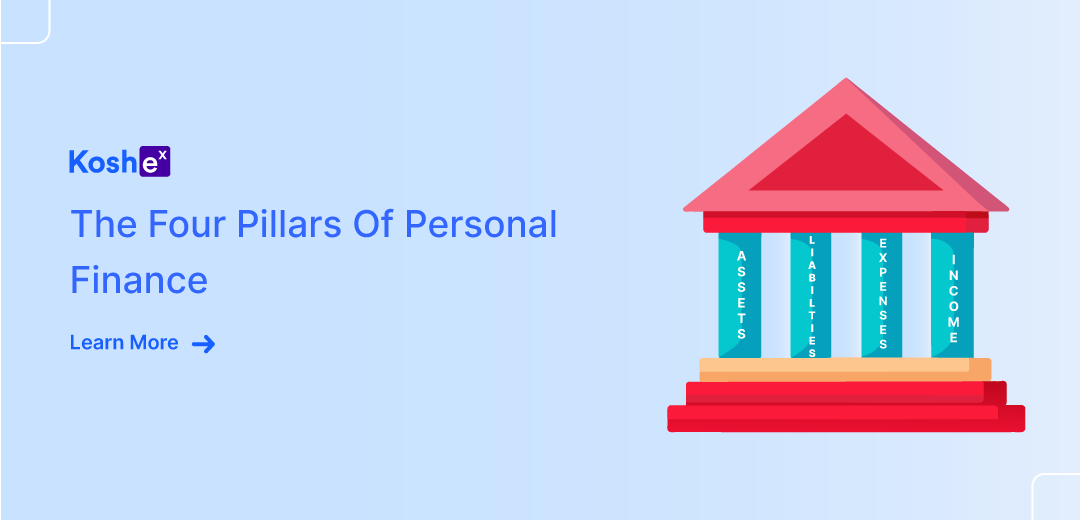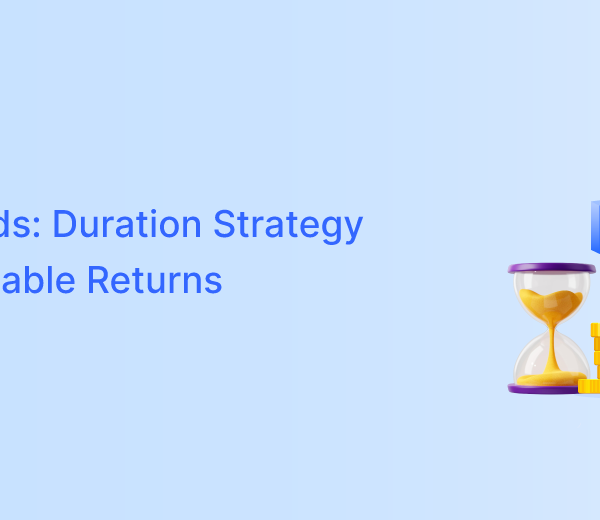Personal finance is a fundamental aspect of our lives that greatly influences our quality and standard of living. It does require careful consideration and management. It includes all the strategies and practices you employ to navigate your financial journey through different stages of your life.
The foundation of personal finance rests on the four pillars of personal finance i.e., assets, liabilities, income, and expenses. Let’s explore these pillars to understand their significance and provide tips on managing personal finances wisely. We will also give a tip to help you stay on top of your finances with Koshex.
Four Pillars of Personal Finance
Here’s a detailed description of the four pillars of personal finance:
1) Assets – The More the Merrier
Assets are anything of value that you own or control. We can also define assets as anything that enhances our cashflows or financial standing. They contribute to your net worth and can help you generate income or increase your wealth through capital appreciation.
Types of Assets
We can classify assets into the following categories:
- Liquid Assets: These include assets that can be easily converted into cash. It includes cash, savings accounts, fixed deposits, and short-term investments.
- Investments: This normally includes your long-term investments like stocks, bonds, mutual funds, real estate, and retirement accounts.
- Fixed Assets: Any asset that is not held for the purpose of investment and not readily convertible to cash can be classified as fixed assets. This includes vehicles, machinery, and any other valuable personal possessions.
Accumulating a diverse range of assets is crucial for building wealth and achieving financial goals. Investments can generate passive income. Managing assets contributes to long-term financial stability. But it is essential to understand what truly is an asset for you. If any of your holdings strains your finances and increases your cash outflow, then it might be a liability disguised as an asset.
2) Liabilities – The Lesser the Better
Liabilities represent debts and financial obligations that you owe to others. This includes loans, mortgages, and credit card balances. It is anything that extracts money out of your pocket.
Types of Liabilities
Following are the different types of liabilities that you can have:
- Secured Loans: Secured loans basically include loans that are secured against collateral security furnished by the borrowers. Mortgages, home loans, loans against assets, auto loans, etc. are some prime examples of secured loans.
- Unsecured Loans: These include loans that are not backed by any collateral security. Unsecured loans can be either raised through banks or from third parties like friends, relatives, or lenders. Credit card balances, personal loans, loans from relatives, etc. are examples of unsecured loans.
Managing liabilities is essential to avoid excessive debt and financial strain. It’s always wiser to raise debt only when needed and not rely excessively on debt to meet your needs. Staying within your means is one of the best ways to avoid debt.
3) Income – Desire for Higher
Income is the money earned or received by you. It can be earned through employment, investments, or from any other sources.
Types of Income
Income that you normally earn can be classified into these two major categories:
- Active Income: This includes the income that you actively work to earn. Salaries, wages, profits from your business, etc. form part of your active income as you have to actively put efforts to generate this income. Here, you are working for money.
- Passive Income: Passive income includes those income that don’t require your active attention or time. Rental income, dividends, and interest from investments are some of the examples of your passive income. Here, money is working for you instead of you working for money.
Generating a steady and diversified income stream is essential to meet your daily expenses, saving, and investing. As inflation rises over time and your responsibilities increase, a focus on increasing your income over time is essential to contribute to your overall financial growth.
4) Expenses – Keep it Low to Grow
Expenses are just the opposite of income. It includes all the costs and financial outflows associated with your lifestyle. This includes your bills, groceries, entertainment, and any other discretionary spending.
Types of Expenses
Following are the different types of expenses that you can normally incur:
- Fixed Expenses: These are the regular and consistent expenses that will accrue each month. This normally includes rent or mortgage payments and utility bills.
- Variable Expenses: It includes those costs that fluctuate each month. This includes costs such as dining out and entertainment.
- Discretionary Expenses: These include those expenses that are not essential and occur once in a while. This includes both good expenses like vacations and luxuries as well as bad expenses like medical emergencies.
Managing expenses is vital for a healthy financial life, maintaining a balanced budget, and avoiding financial stress. You need to regularly review and optimize your spending habits to contribute to financial stability and the ability to achieve your financial goals.
Tips to Manage Your Personal Finance Wisely
While you understand the four pillars of personal finance, here are some quick tips to manage your personal finances wisely:
- Create a Budget: You need to develop a realistic budget considering your income, expenses, and savings goals. You should regularly review and adjust your budget based on changes in your financial situation.
- Emergency Fund: You should build an emergency fund to cover any unexpected expenses. The emergency fund normally includes 3 to 6 months of your living expenses. This provides a safety net in case any financial emergency arises or you lose your active income due to job loss or recessionary trends in your business.
- Debt Management: You should prioritize paying off high-interest debts. You need to develop a strategy to eliminate debts systematically in order to get debt-free. You can start with the ones carrying the highest interest rates.
- Invest Wisely: Investments are key to managing and growing your wealth. You should diversify your investments to manage risk. You should consider your long-term goals and choose investments that align with your risk tolerance and financial objectives.
- Insurance Coverage: While investments help increase your wealth, insurance acts as a safety net in case you fall. You should ensure that you have adequate insurance coverage. This includes health, life, and even property insurance. Insurance protects you from unforeseen events that could have significant financial implications.
- Retirement Planning: You should regularly contribute to your retirement planning accounts to lead an independent and stress-free retirement life. You should start early to benefit from compounding and ensure a comfortable retirement.
Summing Up
The four pillars of personal finance provide a holistic framework for managing your financial life effectively. By understanding and optimising the four pillars i.e., assets, liabilities, income, and expenses, you can achieve financial stability, build wealth, and work towards your long-term financial goals.
By following the above principles, you can navigate the complexities of personal finance with confidence and build a solid foundation for a secure and prosperous financial journey. The best way to manage your personal finances effectively is to build assets and invest actively.
Koshex has been investors’ choice to invest and create a well-diversified portfolio. It offers 5000+ different mutual funds to invest in that attend to each investor’s needs and preferences. Further, you can invest in smart deposits, fixed deposits, or even digital gold to further diversify your portfolio. Get on top of your personal finance with Koshex!









obviously like your website but you need to test the spelling on quite a few of your posts Several of them are rife with spelling problems and I to find it very troublesome to inform the reality on the other hand Ill certainly come back again